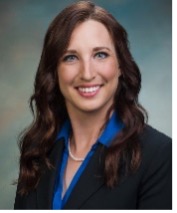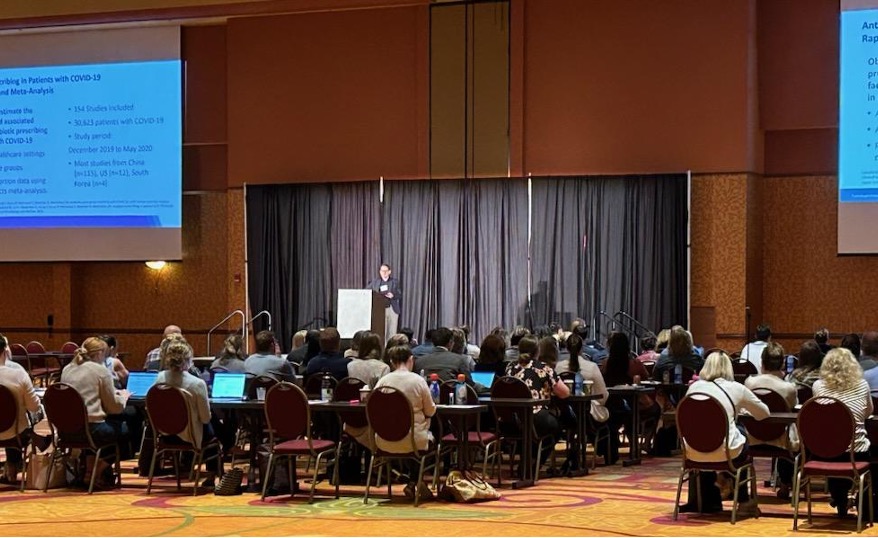

This meeting recap was generously provided by: Jenna Preusker, PharmD, BCPS – Nebraska ASAP Pharmacy Coordinator

The 2023 Nebraska Antimicrobial Stewardship Summit was held on Friday, June 2, 2023 at the Embassy Suites Conference Center in La Vista, NE. The event was hosted by the Nebraska Antimicrobial Stewardship Assessment and Promotion Program (ASAP) in conjunction with the Nebraska Department of Health and Human Services and UNMC. Over 200 participants were in attendance and included physicians, advanced practice practitioners, pharmacists, infection preventionists, nurses, and others.
The day opened with a warm welcome from our Nebraska state epidemiologist, Dr. Matt Donahue.
Following Dr. Donahue, our keynote presentation on communication strategies for antibiotic stewards was delivered by Dr. Julia Szymczak, a sociologist from the University of Utah who has dedicated her career to studying the topic. Key points included:

- Stewards need more than proficiency in ID, microbiology, data analytics, and informatics; they also need social and communicative skills to implement change in complex organizations.
- In her studies interviewing hundreds of clinicians that interact with antibiotic stewards, Dr. Szymczak learned that positive interactions included:
- Communicating information of value in a thoughtful manner
- Attempting to understand where the provider is coming from
- Created a shared sense of mission between the steward and provider
Applying the 3 Cs of Stewardship (Context, Communication, and Collaboration) to encounters in the unique facility in which you work can improve interactions.
Following Dr. Szymczak’s engaging presentation, we welcomed Dr. Salman Ashraf to give an update from the Nebraska Healthcare Associated Infections and Antimicrobial Resistance Program at Nebraska DHHS. Dr. Ashraf’s discussion included:

- Trends in healthcare-associated infections
- Nebraska has the highest SIR for surgical site infections (SSIs) following colon surgeries in the nation and the fourth highest following abdominal hysterectomies. Collaborative efforts are ongoing to decrease SSIs.
- Nebraska critical access hospitals have the highest SIR for C. difficile Infections among all 50 states in the US in 2021 (with 36 facilities contributing to this report).
- Nebraska DHHS has funding assistance available to assist facilities in the implementation of NHSN AUR reporting.
- Trends in multidrug resistant organisms (CRE/CP-CRE, CRPA, C. auris)
- CRE/CP-CRE and CRPA isolates are increasing in Nebraska
- No isolates of C. auris have been identified in Nebraska recently, but all yeast isolates from normal sterile site need to be identified to the species level. C. auris is commonly misidentified in labs.
- CDC’s updated guidance to prevention and response to MDROs
- Nebraska DHHS protocol for tracking targeted MDROs and keeping facilities informed
- LTCF support with infection prevention and control and antimicrobial stewardship efforts
- Healthcare-associated legionnaires’ disease
Through the rest of the morning general session agenda, we heard expert updates from:
Dr. Bradley Langford, a pharmacist with Ontario Public Health who shared data showing COVID-19’s impact on antibiotic use and resistance. Did you know…
- Unnecessary antibiotic use is estimated to be high in COVID-19 patients. Only 8.6% of hospitalized COVID-19 patients had a bacterial co-infection, but during the pandemic 74.6% of COVID-19 patients received antibiotics.
- There was a high prevalence of antibiotic resistance in COVID-19 patients. Predictors for resistance include low and middle-income countries, ICU setting of care, comorbid diabetes, and receipt of IL-6 inhibitor therapy (i.e. tocilizumab).
- Moving forward, efforts must be made to increase focus on health equity, global trust and collaboration, and private-public partnerships. Stewards can bring attention to the importance of antibiotic stewardship, avoid antibiotic use in viral pneumonia, and leverage technology to extend reach.
Emily McCutchen, the manager of the Nebraska Public Health Laboratory gave an engaging presentation about the services NPHL provides to both healthcare facilities and citizens of the state of Nebraska. Highlights include:
- NPHL can aid labs with the impending danger of Candida auris. It was noted that healthcare and clinical labs must make sure their instruments are up to date to avoid misidentification of C. auris.
- NPHL educational efforts include lab alerts, newsletters, laboratory surveys, statewide laboratory calls, individual communications and trainings.
- Future directions and opportunities for NPHL include sequencing for clinical care, same-day sequencing, direct from specimen sequencing, and wastewater surveillance for resistant organisms.
During the lunch break and throughout the day, attendees had the chance to give their live impressions from the conference to Dr. Rick Starlin and Dan German with Nebraska ICAP. Attendee and presenter interviews are being compiled into a podcast that will be shared on an upcoming Nebraska ICAP Dirty Drinks podcast episode scheduled for June 29. Check them out on Twitter, @dirty_drinks!

Patient-care organizations in Nebraska also provided antibiotic stewardship information at several booths throughout the day. It was a great networking opportunity and a chance to learn about the various antibiotic stewardship services available for no cost to all facilities in Nebraska.
Check out our second post to learn more about the afternoon Summit sessions!
2023 session recordings are now available on the Nebraska ASAP YouTube channel: Nebraska ASAP – YouTube

1 comment